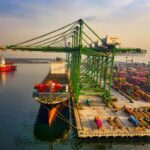Prime Minister Sir Keir Starmer has revealed that the UK is engaged in discussions with several nations about establishing overseas “return hubs” for asylum seekers whose claims have been rejected, during his first official visit to Albania.
Speaking at a joint press conference with Albanian Prime Minister Edi Rama, Sir Keir said the government has initiated international talks focused on relocating individuals denied asylum in the UK to third countries for processing.
He declined to specify which countries are involved or where rejected asylum seekers may be transferred. However, Albania has clarified that it is not part of these discussions.
Sir Keir’s visit to Albania centered around broader efforts to combat illegal immigration and organised crime. With more than 12,000 people having crossed the English Channel so far this year, 2025 is on pace to become a record-setting year for crossings.
“We are in talks with a number of countries about return hubs,” Starmer stated, describing the concept as “a really important innovation.”
Previous reports by the BBC have indicated that the UK is targeting countries in the western Balkans – including Albania, Serbia, and Bosnia and Herzegovina – for potential cooperation on these return hubs.
Unlike the Conservative government’s scrapped Rwanda plan, which would have seen asylum claims processed abroad regardless of status, Starmer’s proposal would only apply to individuals whose claims have been conclusively denied with no further appeal options remaining in the UK.
Italy has already implemented a similar agreement with Albania, allowing for the temporary relocation of rejected asylum seekers pending deportation. However, legal challenges have delayed the initiative’s full rollout.
Albanian Prime Minister Rama emphasised that his country’s arrangement with Italy is unique and will not be replicated elsewhere.
“That scheme is a one-off with Italy because of our very special relationship,” Rama said, adding that several other countries had made inquiries but Albania declined due to its exclusive agreement with Rome. “We said no because we are loyal to our marriage with Italy.”
Starmer maintained that the return hub proposal aligns with broader UK-Albania cooperation on migration issues, particularly efforts to reduce the number of migrants crossing the Channel from Albania.
The announcement sparked criticism from the Conservative opposition. Shadow Home Secretary Chris Philp described the trip as “an embarrassment” after Rama’s comments appeared to rebuff the UK’s intentions.
“Starmer jetted off and now the Albanian Prime Minister has made clear that there will be no UK return hubs in Albania,” Philp said. “So, what was the point of this entire visit?”
Despite the criticism, the UK government highlighted progress in managing migration from Albania. It cited a 95% decrease in Albanian small boat arrivals over the past three years and a doubling of returns in the past two years.
Immigration policy has been a dominant issue for the Starmer government this week. On Monday, ministers unveiled a White Paper outlining new measures aimed at reducing legal migration levels.
Sir Keir defended the new proposals as a means of regaining control over immigration policy, insisting they were not a reaction to the recent electoral success of Reform UK, the political party led by Nigel Farage. Reform UK has advocated for a freeze on non-essential immigration and returning small boat arrivals directly to France.
While in Albania, Starmer announced expanded cooperation aimed at tackling illegal migration and organised crime, stressing his commitment to “retake control of the borders.”
“The last government lost control of the borders. I am determined that we will retake control,” he declared. “That means we’ve got to have a concerted effort to smash the gangs that are running this vile trade.”
He praised existing collaboration with Albania for contributing to reduced migrant numbers and expressed a desire to build on that progress.
As part of this commitment, the UK will expand the Joint Migration Task Force – a unit focused on intelligence-sharing and anti-smuggling operations – to include North Macedonia.
The enhanced UK-Albania partnership will also address the “revolving door effect,” in which deported migrants return home only to evade law enforcement and attempt re-entry into the UK.
Other new measures include:
- A reintegration programme for young Albanians to support employment and societal integration
- Funding for a forensic evidence-sharing initiative to track and compare DNA of Albanian-linked criminals to assist with investigations in the UK
- An additional £1 million investment to modernise Albania’s forensic, biometric, and digital crime-fighting capabilities
- Greater intelligence-sharing capabilities, including the use of UK-funded drones to target criminal groups transporting migrants through the Western Balkans corridor
The visit underscores the UK’s renewed focus on curbing illegal immigration through bilateral partnerships, tougher enforcement, and strategic international agreements.






